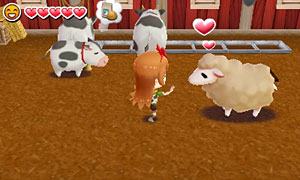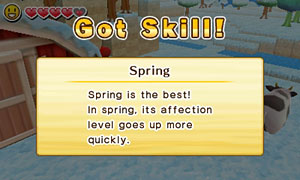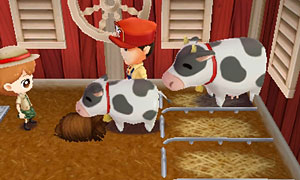Chickens, Cows, and Sheep
You won't have any livestock or chickens to care for when you first start out in the Lost Valley. After you meet the crazy Doc and place a Barn Insta-Building in the area, a wandering cow will find its way to you building.
For chickens, you will need to give Doc 15 Softwood Lumber, 15 Material Stone, 10 Soil, and 8000 G to receive a Coop Insta-Building. You won't receive a free chicken though.
Once a Barn has been placed in the valley, Hunter will open his shop inside of your barn on Mondays, Tuesdays, and Saturdays. He will sell baby animals for your farm. A calf is 10,000 G each, Lambs are 10,000 G each (starting in Fall of your first year), and Chicks are 2000 G each (after you place a Coop in the valley).
If you ever want a break from taking care of your animals, use your ARCHITECT to place the barn or coop into your storage. You won't have to spend the time to care for them while they're stored away, but you also won't gain any of the animals' products. When you want your animals again simply place the barn or coop back out into the valley.
A standard barn and chicken coop will house five animals. You can upgrade a barn to house up to seven animals, but there is no upgrade for the coop. Multiple barns and coops can be placed in the valley if you want to have more animals.
Animal Care

Every day you will head into your barns and coops to care for your animals. The animals will want to be fed and petted, and brushed if necessary. A thought bubble will appear above each animals' head to let you know what type of attention it needs from you.
Cows and sheep will not give up their milk or wool unless they've been fed. In the back of the barn is a feeding trough where you can place animal feed. The animals will finish eating at the top of the hour (e.g., 9:00, 10:00, 11:00, and so on), after which you can then collect the milk and wool. If you want to ensure that they are all finished feeding at the same time, once you fill up all of the feed bins and see one of the animals eating, press the X Button on your Nintendo 3DS to bring up the main menu, then select the Save/Load option. Exit the save screen without saving to see the animals place themselves in front of the feed bins.
You may also chose to graze your cows and sheep instead of feeding them within the barn. On the outside of the barn is a grazing bell that will call Calvin the Harvest Sprite to bring the animals outside. Being outside will raise animal affection and lower stress, but you need to remember to ring the bell again before 6:00 pm to put the animals back inside the barn. Cows and sheep do NOT like staying outside overnight, and in the morning Calvin will scold you for leaving the fuzzy-wuzzy animals outside all night. There is nothing in-game that will automatically bring the animals back inside at the appropriate time; not even the pet dog will do it. Chickens will never leave the chicken coop.
Ideally, animals prefer to eat twice per day. You can get by with just feeding them once per day, but it is easier to receive higher quality goods with two feedings. Even when grazing they'll eat twice. If they are brought back inside before they finish their second feeding, you might see the feed bag bubble above their heads when you go into the barn.
Inside of each barn is a Farm Note that will give you details about each one of your animals: name, age, loyalty, stress, condition, cleanliness, appetite, and skills. These stats give you the general health status of your animal. The stress bar is somewhat important to keep an eye on, as an animal will become sick if the stress bar is too high. You can buy Chicken Medicine and Animal Medicine from Sam's Shop to heal the sick animal. The other option is to hire the secret Harvest Sprite, Oliver, to reduce your animals' stress levels. You have to finish the complete storyline in order to unlock Oliver's abilities.
Skill Traits
There are a variety of animal feeds that you can give to your animals. The feeds will teach animals skills that can be beneficial when harvesting products. Cows and sheep can learn up to three skills, and chickens can learn only one skill.
Sam's animal feed inventory will expand as you complete Hunter's feed requests. The feeds can become rather expensive, so alternatively you may craft the feeds by using your Windmill. Some of the higher level feeds can only be crafted in the Windmill. All of the animal feeds require Fodder Cornmeal, which is a mutation of Corn that appears during Summer.

New skills will be triggered when you pet an animal that has earned enough points in a skill level to learn the skill. An alert will appear on the top screen of your Nintendo 3DS, and the bottom screen will display the skills you already know as well as any available skill slots. You can overwrite an existing skill with the new trait by selecting it from the bottom screen. If you don't want to learn the new skill, simply press the B Button to cancel learning.
Feeding an animal special feeds will give them a skill up based on the feed's item description. For example, feeding Fall Feed will give an animal the Fall skill; in theory, this means it will be easier to raise an animal's affection during Fall in order to receive higher quality goods. On the other hand, having a skill is not as helpful as you would think that it should be. For example, even if you have an animal with a maximum level 4 More Goods skill you'll rarely receive more than one good when harvesting, and when you do it will only be two instead of one.
While the skills seem useful, they take more effort to learn than what players will actually benefit from.
Keep in mind that some feeds will have a negative effect on existing skills the animal might have. Feeding an animal Clever Feed so it earns +12 points in the Learning skill may seem like a good idea, but if the animal also has the Great Goods skill you'll find that Clever Feed earns -6 points in that skill! Then to offset that, you might feed it Harvest Feed to earn +6 points in Great Goods, but in exchange that earns -3 points in Learning. An animal will never unlearn a skill it knows, even if you give it enough feed that it technically would have negative points in a skill level.
Feeds will have two associated skills. For example, feeding an animal Harvest Feed will earn you the More Goods skill and eventually the Great Goods skill too. Feeding an animal Clever Feed will earn you the Learning skill and eventually the Great Goods skill. Winter Feed will earn you the Winter skill and eventually the Fall skill, and so on.
Collecting Animal Products
Cows will give you milk, chickens will give you eggs, and sheep will give you wool. Cows and Chickens will produce goods every day, but sheep will produce wool every three days. The quality of the goods you receive will be based on an invisible affection meter. The higher the animals' affection, the better quality goods they will give:
Normal → Great → Ultimate → Supreme → Miracle
As you harvest products, the animal may give better quality goods. Eventually you'll notice that it will reset back down to the normal level and then start to increase up again. Taking good care of your animals and having them learn special skills will help to increase the chances of receiving Miracle-quality products.
Either Sam (lower price) or Hanna (higher price) will buy your milk and eggs, but only Sam will buy sheep's wool from you. The sale prices of animals goods are:
| Product | Normal | Great | Ultimate | Supreme | Miracle |
|---|---|---|---|---|---|
| Egg | 30 G / 45 G | 50 G / 75 G | 70 G / 105 G | 100 G / 150 G | 120 G / 180 G |
| Milk | 50 G / 75 G | 70 G / 105 G | 90 G / 135 G | 120 G / 180 G | 150 G / 225 G |
| Wool | 100 G | 140 G | 180 G | 200 G | 250 G |
The quality you receive is already set for the day when you harvest. For example, saving your game before picking up an egg, and then reloading your save game if you get a Great Egg instead of the Ultimate Egg you wanted won't work; you'll just keep picking up a Great Egg.
Breeding
For breeding chickens, simply have enough room in a Chicken Coop to house the new bird. Then when harvesting an egg, select the "Incubate" option instead of "Harvest." It will take 7 days for the egg to hatch, and another 7 days for the chick to mature into a chicken. Note that chickens will not inherent skill traits.
For breeding cows and sheep, you'll need to unlock the potions from Gareth and Tabitha. These two magical researchers will request that you fetch them ingredients for their experiments, and in return you'll learn the special breeding potions. You can then use your kitchen to cook the potions.
Each potion has an animal personality that the baby animal could learn if the parent hasn't already learned 3 skill traits. If the mother already has 3 skills, the potion's skill will not carry over.

When you are ready to impregnate one of your cows or sheep, have the potion in your bag and talk to Hunter when he is inside of your barn. You'll then see an "Impregnate" option in his shop inventory. Pick the mother animal you want to breed, and then pick the potion from your bag. The pregnant animal will be moved into the separate space until the birth. The pregnant mother will not need to be fed, nor will it go outside when you ring the barn bell to graze your animals.
A pregnant cow or sheep will give birth after 6 days. The skills that the baby learns will be at half of the level as its parent. For example, if your momma cow has Great Goods at level 2 (with 126 points), its baby will have Great Goods at level 1 (with 63 points). A baby cow or sheep will always inherit the skills of the mom, even if that means the skill is only learned at level 1 with 0 points into the skill level.
Lambs will take about 5 to 7 days to mature into a sheep, and calves will take about 14 days to grow up.
Old Age
Your animals will pass away when they become old. Sheep live about 5 years, chickens are about 6 years, and cows are about 8 years. You will start to have dreams about your animals passing away shortly before it happens, so you can either let it naturally occur or sell your animals by going into the barn and selecting Sell Animals from the Farm Notes book. Having a warning in advance via a dream isn't a guarantee that the animal will die the next morning, as it may take a few days.